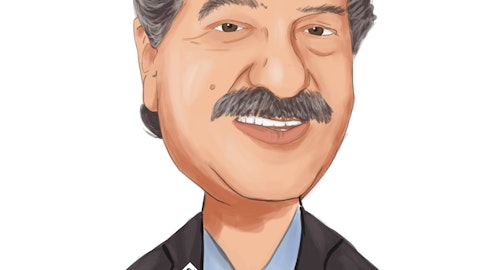Karen Zaderej: Yes. Thanks for the question. Yes, we saw OMF depressed during COVID, people became concerned about having surgery in their mouth. And it was – has just been the neurotization in OMF has been slow to recover. And we’re starting to see that in the Q4 time frame. We see that the two publications that I mentioned will also be very helpful. One of the things – the majority of the work that we’ve done in OMF has been in benign mandible reconstructions and then some of the injuries from dental procedures, so with some teeth extraction and putting in dental implants. And of the two papers that I mentioned, this is the first case series looking at patients with malignant tumors and having a mandible reconstruction. And the concern is then, well, with the follow-on treatment radiation in particular, that these patients have affect the nerve regeneration and what this paper showed is that these patients actually achieved quite good meaningful recovery rates.
And so we think that will be very helpful for surgeons as they’re making decisions about the care pathway for these patients, and they’re really trying to achieve quality of life for patients in both benign and malignant tumor reconstruction. The second paper had to do with the iatrogenic injuries from dental procedures and just recognizing that these have a lifelong impact to patients when they have numbness in the lips and the tongue and the mouth that, that can have an impact in both self-esteem as well as sort of practical things in the way that you interact and chew and shave and sort of live your life. And so that will be helpful, I think, as we reengage surgeons. So we’re optimistic in what we see. Long answer is we’re optimistic with what we see with OMF and expanding into head and neck with mandible constructions.
We think that will be a nice opportunity to continue to reengage with those surgeons and bring in new surgeons who can adopt this procedure.
Ross Osborn: Okay. Great. And then would you discuss your efforts on accelerating the referral process from patient showing up on your re-think pain website?
Karen Zaderej: I’m sorry, it’s hard to hear the question. Can you say it again?
Ross Osborn: Sure. Would you discuss your efforts on accelerating the referral process from patients showing up in your re-think pain website?
Karen Zaderej: Sure. Thank you. Yes, we really have learned a lot on activating patients through the work that we’ve done in resensation. So helping women in that case be advocates for their own health care to go in and have – be armed with the questions to ask their surgeon and decide if sensation and breast reconstruction is important to you. Then if it is important, then here are questions to ask your surgeon, here’s what you can do to take control of your care. And we’re looking to apply a lot of those same tools into helping patients who suffer from chronic pain, determine do they have potentially a neuroma that it’s because of the pain or was it neuropathic pain? And if it is, how can they find a surgeon who does a surgical treatment of pain or a pain surgeon, rather than ending up in a pain clinic as their primary care, which will address the symptoms but not address the cause of the pain.



